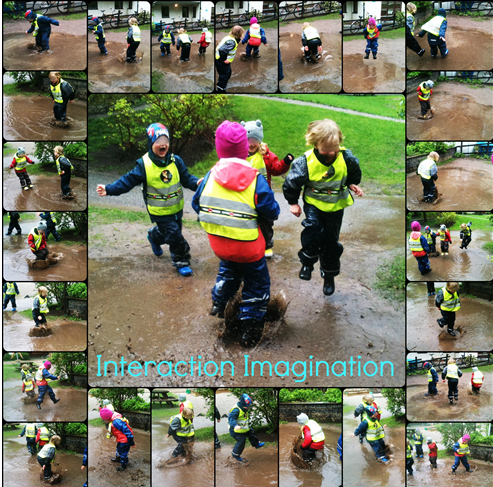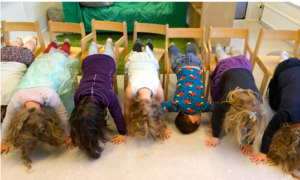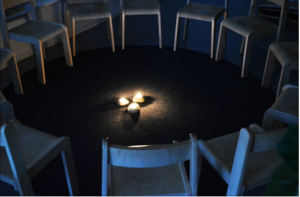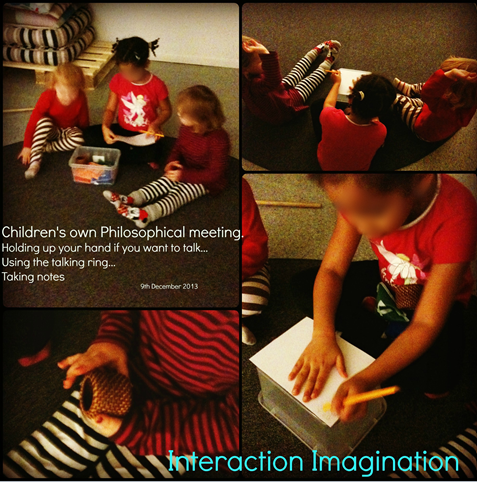
by Suzanne Axelsson

How many different ways can we jump into a puddle? A philosophical play. A way for the children to understand there are many ways to do things, and trying out each other’s ideas can be enjoyable and rewarding and sometimes risky.
Philosophy with children is not about Plato, Socrates and Descartes – but about creating a safe and brave space for children to explore ideas and concepts together, to learn from each other, to learn how to challenge ideas and be challenged, to ask questions and think critically and creatively. It is dialogues centred around what is interesting and meaningful for the children – because if it wasn’t, there would be no dialogue – as simple as that.
The structure of the philosophy session we created was as follows
- Stimulus (a question, a story, photos, an object, an action – essentially something to stimulate the dialogue)
- Thinking Pause (some time to think about how/what to answer and why that answer, 1-2 minutes)
- Dialogue (the aim was always for this to be the children’s dialogue and the adult scaffolds their suggestions. The adult does not present facts or “teach” during this time.)
- Meta Dialogue This is a dialogue about the dialogue. I knew that this would be too much for pre-schoolers, so instead our meta dialogues became the teacher reading back the notes of what was said during the session (as verbatim as possible) and the children saying if we had made a mistake, informing us of what they really said, and/or having the opportunity to change their mind so we could note that down. They loved listening out for what they said, so this was always an important part of the process).
- Bubble Game (this was added on to the end because the children enjoyed it so much, despite designing the game to train self regulation, so it felt like a win win situation).
Important things to consider
Staying on topic is important in the philosophy session. We don’t go off topic unless the entire group consents, because there is then the risk that someone who was going to contribute has not been given the chance. Staying on topic is not about adult control, but about the group taking responsibility to ensure everyone has been heard.

Part of a philosophy session where we explored “How to sit so it’s easy to listen” and “How to sit so it’s hard to listen”. The children drew their ideas and we tested them.
We always sat in a circle. I think it is important to consider that there is not one way to sit for a philosophy with children session –
- chairs in a circle with small spaces in between so that the children could be fully aware that this space is mine and not waste energy on trying to work that out.
- mats on the floor,
- around a table,
- laid down on the floor on our tummies facing inwards
– the only constant has been a circle; because we are creating a sense of equality. We are all equally in the circle, not a teacher leading from the front, but adults and children as equals. It also means we can all see each other which is important, because listening is more than sounds.

Chairs slightly apart so each child’s space was known, and using wonder as a tool for concentration – a darkened (but not dark) room with candles made the philosophy sessions feel special. This is an image of an early philosophy session.
At the start of every philosophy session I would remind everyone:
“We listen with our
Ears
Eyes
Heart and
Mind.”
We hear the words, the tone and volume, we see what is being communicated and how it is being communicated, we listen with empathy and respect, we listen so we can think critically and creatively about how we will respond.

They did philosophy meetings as part of the autonomous play – and we had play talking rings for them to use. The children are all pre-writers.
Taking turns to talk – in the beginning, turn-taking was hard, and so was the responsibility of listening. We introduced talking rings (2 different serviette rings), one for the leader of the dialogue and one for all the other participants. Previously we had one pine-cone, that when someone held the cone only that person could speak, the downside was that having just one cone meant it was hard for the teachers to support the children when needed without breaking the rule of only the person holding the pine-cone can talk – this is why two talking rings were necessary. Those not holding a ring focused on actively listening, rather than trying to be silent.
I once had a speech therapist observe one of my philosophy sessions. She was lyrical about the concrete nature of the dialogue – the use of the talking rings, keeping on topic and the fact we only continued for as long as there was interest. She pointed out that this was an excellent way for children to become competent communicators
Working philosophically with young children requires us to put our own agendas aside and attune to the children’s pace. It requires us to practise asking questions that are specific and easy enough for the children to understand but are not leading to specific answers. Prepare a few follow up questions that are also open.. But if a dialogue does not get going don’t force it.
The interconnection of everything
Philosophy with young children is not hard, but complex – it is the interconnection of everything:
-
focusing on relationships and a sense of trust and belonging,
- helping children acquire the skills needed to be able to listen to understand, such as language acquisition, focus, self regulation, physical strength to be able to sit comfortably, critical and creative thinking
- providing experiences that expose the children to facts and information – excursions, books, experiments etc
- scaffolding children who need extra support to be able to participate
- providing opportunities for the children to do things in different ways, e.g. how many different ways can we jump into a puddle, how many different ways can we sort these objects, various art experiences to explore different perspectives
- and last but not least, adequate amounts of autonomous play that we can observe so we can ensure that the stimuli are most likely to inspire joy-filled, interesting dialogues. The Original Learning Approach is a reflective tool for this.
Philosophy with children must be rooted in joy. The goal is not for the children to talk about something the teacher has presented, the goal is to empower the children to want to participate, share their ideas and learn together about the world. To make learning feel more play-like – autonomous, joy-filled and intrinsically motivated.


